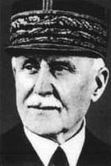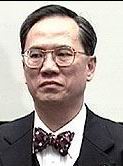 Henri Philippe Pétain (1856-1951) |
 Donald Tsang (1944 - ) |
Henri Philippe Pétain
Emerged from World War I as a national hero
Pétain was a distinguished veteran of World War I and was hailed as a French hero. Pétain rose to be Commander-in-Chief of the French army in 1917 and was promoted to Marshal of France in 1918. In 1935 he was promoted to Secretary of State and became one of the main advocates for French appeasement of Nazi Germany.
Vichy France
In Spring 1940, France was invaded by Nazi Germany, and Pétain was appointed head of state. In June, Pétain signed an armistice with Germany that gave the Nazis control over the north and west of the country, including Paris, but left the rest, including about two-fifths of France's prewar territory, unoccupied, with its capital in the resort town of Vichy. Pétain order harsh measures, including installation of exceptional jurisdictions, proclamation of anti-semitic laws, and imprisonment of his opponents and foreign refugees. Pétain did not resist requests by the Germans to indirectly aid the Axis Powers. However, Vichy France remained neutral as a state, albeit opposed to the London-based Free French led by Charles de Gaulle. Petain provided the Axis forces with large supplies of manufactured goods and foodstuffs, and also ordered Vichy troops in France's colonial empire (in Dakar, Madagascar, Morocco, Oran, Syria, and Tunisia) to fight against Allied forces and receive German forces without any resistance. In November 1942, Germany invaded the French unoccupied zone. In September 1944, Pétain and other members of the Vichy cabinet were forcibly moved to Germany.
Postwar trial
In April 1945, Pétain was returned to France, where he was tried for treason, convicted and sentenced to death. The death sentence was commuted to life imprisonment by Charles de Gaulle in August 1945, on the grounds of his age; he was 89. He died in 1951 in prison on Île d'Yeu, an island off the Atlantic coast.
Comparison
Pétain was widely accepted by French people as France's savior during and after World War I and during World War II. Charles de Gaulle, the head of the French provisional government after World War II, had no choice but to sentence Pétain to death for treason (under pressure from the Allied Powers and to justify warfare previously fought by Free French against Nazi Germany) and then commute the death sentence to life imprisonment (to avoid outraging the French people who supported Vichy France during World War II).
Donald Tsang is just a lucky civil servant who was selected by his British master and later Chinese master to head the civil service of Hong Kong, not because he is a talented, outstanding sage, but because he is a tame, obedient slave. In fact, Donald's predecessors, such as John Chan (陳祖澤, 1943-) and Anson Chan (陳方安生, 1940-), were disliked by the British ruler and Chinese ruler for being too competent and therefore unwillingly quit their civil service career before reaching the climax thereof.
Unlike Pétain who guided France through wartime and thereby was regarded as France's savior by
French people, Donald Tsang is no more than a proxy working selfishly for colonial Britain before
1997 and barbarian China after 1997. Pétain was courageous and respectable. But Donald Tsang is coward and reproachable.